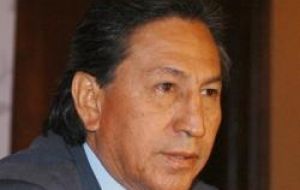MercoPress. South Atlantic News Agency
Former president leads vote intention for April Peruvian general elections
 Alejandro Toledo is supported by the business community
Alejandro Toledo is supported by the business community A former president, an ex mayor and the daughter of an ousted president lead the public opinion polls for Peru’s presidential and parliamentary elections scheduled for April 10th.
The latest poll to be made public shows ex President Alejandro Toledo (2001/2006) with 30.7% of vote intention followed by the popular ex mayor of Lima Luis Castañeda 21.3% and Keiko Fujimori, 20.3%.
The opinion poll from Imasen, contracted and published by Lima’s daily La Republica interviewed 1.868 people in urban and rural Peru with an error margin of plus/minus 2.3 percentage points.
Ollanta Humala a former Army officer who was defeated in the 2006 run off by current president Alan Garcia came in fourth place with 12.1%, while the former cabinet chief and Economy minister Pedro Pablo Kuczynkski managed 5%.
In a previous January 14 opinion poll from Datum Toledo had 27% vote intention and Castañeda 22%. A more specific Imasen poll which included the capital Lima and the adjoining electoral district of the port of Callao, Toledo figured with 34.2%, Keiko Fujimori 22.8% and Castañeda 21%.
Toledo is well-liked by the business community and led Peru's first push into free trade pacts during his 2001-2006 term, although he has progressive stances on social issues like abortion and drugs use that at times have been criticized.
Castañeda has hired mainstream economists as aides but has been reluctant to announce a detailed policy platform. He is well-liked in the capital of Lima but a virtual unknown in the provinces. He comes from the tiny National Solidarity party and has denied corruption allegations linked to a slew of public works projects he carried out.
Keiko Fujimori, a popular conservative lawmaker, could benefit from a sizable party infrastructure left behind by her father. But her candidacy may be hurt by memories Peruvians have of her father, who was forced from office under a cloud of corruption and human rights scandals.
Instead of trying to present a kinder and gentler image of her party, the younger Fujimori has emphasized its law-and-order credentials and picked Rafael Rey, a former defence minister and staunch social conservative, as one of her vice presidential candidates. An Ipsos Apoyo poll showed more voters think Rey will hurt her than help her.
Meanwhile ultranationalist Ollanta Humala, who nearly won the 2006 race, is struggling in fourth place in polls despite trying to recast himself as a moderate. Business leaders say they are unconvinced.
So long as Humala struggles in polls, where he enjoys support of about 10%, the race will be fought between parties in the centre or on the right. That would remove a potential source of downward pressure on Peruvian markets.
At this point in the race, it looks as if mainstream economic policies will be followed by the next president. Peru's economy is set to grow about 6% in 2011 after surging about 9% last year. Orthodox economic policies have been in place in Peru for nearly two decades and helped Peru win investment grade ratings.




Top Comments
Disclaimer & comment rulesCommenting for this story is now closed.
If you have a Facebook account, become a fan and comment on our Facebook Page!